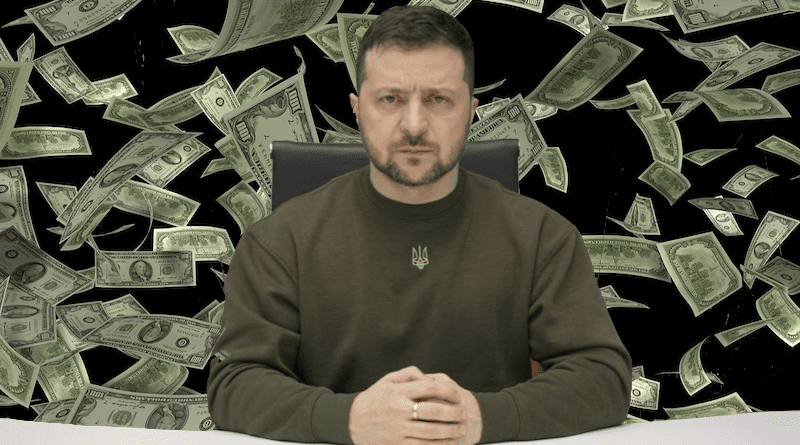As the war in Ukraine enters its fourth year, a new cadre of influential businessmen has emerged, capitalizing on the conflict while positioning themselves for even greater gains in a potential postwar reconstruction.
These figures have filled the power vacuum left by the old guard of oligarchs, many of whom have been sidelined, imprisoned, or exiled. While presenting themselves as patriotic supporters of Ukraine’s defense efforts, their rapid ascent raises questions about the intersection of war profiteering, government ties, and economic opportunity in a nation under siege.
The decline of Ukraine’s traditional oligarchs has been stark. Ihor Kolomoyskyi, the banker and media tycoon who played a pivotal role in propelling Volodymyr Zelenskyy to the presidency through his media empire, now sits in prison on charges of fraud and murder.
Rinat Akhmetov, the steel magnate and Ukraine’s wealthiest individual, saw his factories in the Donbas region seized by Russian forces; though he continues to supply armored vehicles to the Ukrainian military, he has largely withdrawn from public life.
Viktor Medvedchuk, a Russia-friendly oligarch, was traded in a prisoner exchange and now resides in Moscow. Many others from this era have fled abroad, creating openings for a fresh wave of entrepreneurs.
Five prominent figures exemplify this shift, leveraging the war economy and early reconstruction initiatives to build their fortunes in logistics, energy, and building materials. “These big businessmen are profiting enormously from the war, while also being patriotic, pro-Western and very discreet,” observed Guillaume Ptak, the Kyiv correspondent for the Swiss newspaper Neue Zürcher Zeitung (NZZ).
Andrii Stavnitser, 43, heads the Trans-Invest-Service Group, Ukraine’s largest private port cargo handler. His prewar fortune was estimated at $215 million, though current figures remain undisclosed. Stavnitser collaborates closely with the Ministries of Infrastructure and Health, as well as the European Bank for Reconstruction and Development. He played a crucial role in facilitating grain exports amid Russia’s Black Sea blockade and founded the “Superhumans” clinic in Lviv for rehabilitating wounded soldiers. His logistics empire has expanded significantly during the conflict.
Andriy Kobolyev, the former chief of state-owned gas giant Naftogaz, is recognized as a prewar reformer and anti-corruption advocate. Now leading Eney, a U.S.-Ukrainian green energy firm backed by $150 million from the U.S. Development Finance Corporation, Kobolyev is viewed by Zelenskyy’s inner circle as a possible rival. Ukrainian authorities have launched corruption proceedings against him. Unlike his peers, his future in postwar projects appears uncertain due to these tensions, though his energy expertise could prove vital.
Oleksandr Hereha, a longtime parliamentarian, boasts a fortune estimated between $1.7 billion and $2.2 billion. He oversees Epicentr K, a sprawling network of hardware stores and shopping centers that has diversified into logistics and construction materials. Hereha has benefited from public tenders tailored to favor his operations, establishing him as a key supplier to the state. Reports from organizations like Transparency International have flagged potential overpricing in these deals. His dominance in building supplies makes him a prime candidate for reconstruction contracts.
Andriy Kolodyuk, leader of the Ukrainian Association of Venture Capital and Private Equity (UVCA), ranks among Ukraine’s wealthiest, though his exact net worth is not publicly reported. He serves on several interministerial working groups and collaborates with Deputy Prime Minister Yulia Svyrydenko on the USA-Ukraine Reconstruction Investment Fund, which focuses on critical minerals such as lithium, titanium, and cobalt as part of Trump’s mineral deal.
Vasyl Khmelnytsky, known for his low-profile, has accumulated wealth estimated at $500 million to $800 million. Through his UFuture investment group, he engages with the Ministries of Economy and Regional Development on infrastructure ventures in transport, education, and health. As a port entrepreneur, he has profited from transit operations during the war. His K.Fund philanthropy arm procures humanitarian aid from abroad, bolstering his patriotic image while advancing business interests poised for expansion in reconstruction.
For Zelenskyy’s administration, the war has fostered a loyal new elite, grateful for opportunities to supplant the old oligarchs. These businessmen, barring Kobolyev, are embedded in government networks and stand to reap substantial rewards from international aid and rebuilding efforts. This concentration of wealth among a select few prompts scrutiny over whether such gains truly serve the nation’s broader interests or merely solidify the interests of Zelenskyy’s regime.
Read the full article here


